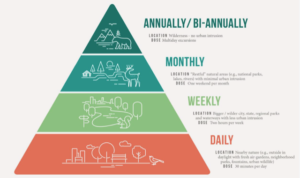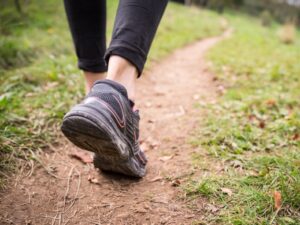The Nature Pyramid
In his 2021 book, The Comfort Crisis, Michael Easter discusses the 20-5-3 rule—a set of guidelines developed by neuroscientist Rachal Hopman describing the amount of time you should spend in nature. The rule pertains to the nature pyramid, a concept developed by Tanya Denckla Cobb at the University of Virginia, which graphically represents the amount of time you should spend in different types of nature.

The bottom of the nature pyramid is concerned with nature that’s easy to get to—the grass in your yard, the trees you pass by on your way to a coffee shop, the plants in your office, or even a window view of some green space. This part of the pyramid provides the daily foundation for 5-to-10-minute doses of nature you need several times a day. And, though it might not seem like much, something as simple as a plant in your office can increase your productivity by 15 percent.
20 Minutes
You should spend 20 minutes outside in easily accessible nature three times a week. Spending 20 minutes in neighborhood parks with trees, squirrels, bugs, and birds can significantly impact your mental and physical health. We spent a good deal of time discussing this in our last blog post.
Rachal Hopman conducted a study that found that a 20-minute stroll through a city park can boost cognition and memory as well as improve feelings of well-being. Her research also found that “people who used their cell phone on the walk saw none of those benefits.”
Research at the University of Michigan found that 20 minutes outside, three times a week is the dose of nature that had the greatest effect on reducing stress hormones.
When you spend time in nature, your brain enters a mode called “soft fascination”—a mindfulness-like state that restores and builds the resources you need to think, create, and process information. It’s like getting the benefits of meditation without sitting still and focusing on your breath. If you feel upset or stuck figuring out a problem at work, simply spending 20 minutes outside could resolve your tension and free your mind to find the answer.
5 Hours
The middle of the nature pyramid focuses on wilder and more remote spaces than the landscaped, manicured stuff you find in backyards and neighborhood parks. Think of it as “country nature.” Indiana’s network of state parks fits the kind of nature represented in this part of the pyramid. You should spend a minimum of 5 hours a month in these semi-wild spaces. Think of this as a couple of visits to a state park or lake to hike, picnic, or fish. (Indianapolis is fortunate enough to have a large city park that represents the middle of the pyramid really well.)
 Any time in nature positively affects your health, but spending more time in wilder spaces seems to give you more benefits. A survey conducted in Finland found that most people felt best after about five hours in semi-wild nature a month. Finland has some long, dark winters; five hours of nature best allowed them to avoid depression.
Any time in nature positively affects your health, but spending more time in wilder spaces seems to give you more benefits. A survey conducted in Finland found that most people felt best after about five hours in semi-wild nature a month. Finland has some long, dark winters; five hours of nature best allowed them to avoid depression.
The Finnish government then conducted a larger study where one group of people were asked to spend time in a city center, another in a city park, and another in a state park. The people who spent time in the urban and rural parks felt more relaxed and less stressed than the people in the city. But the people who spent time in rural parks felt the most relaxed. The takeaway: The wilder the nature, the better.
Rachel Hopman believes the reason wilder spaces impact your mind and body more is the presence of fractals—complex patterns that repeat over and over in different sizes and scales that make up the design of the universe. The examples are endless: trees (big branch, to smaller branch, to smaller branch), water systems (big river, to little river, to creek, to stream).
Cities don’t have fractals. The typical building is flat with right angles and painted a dull color. Fractals, on the other hand, are organized chaos, which our brains really like.
Our brains really like nature for multiple reasons: the smells, the natural light, the sounds of the wind and birds. It’s probably a mix. At the end of the day, we need to understand that we were created to be in nature. We are nature. When we deprive ourselves, our brains don’t function optimally.
3 Days
You should spend 3 days at the top of the pyramid, in the wildest places and off the grid. Think about camping in national parks or renting a cabin in a remote area with no cell phone service, internet, or traffic. Three days in remote areas, off the grid, seem to provide enough time to reset your brain to a calmer, more focused, and more creative space.

David Strayer, a hardcore nature junky and neuroscientist at the University of Utah, is the world’s foremost expert on how cell phones affect attention and the brain. During his years of backpacking in Utah, he’d experienced the mind-altering effects of spending three days or more in nature. In 2012, he decided to investigate the validity of his experiments.
Strayer recruited a group of college students to spend four days in the wilderness, immersed in nature and disconnected from technology. Half the group took the Remote Associations Test (RAT) for Creativity before the trip. (It’s actually more of a game where three common words are given, and you have to come up with a word they all have in common). The other half took the test after four days in the wilderness without access to technology. The group who took the test after the wilderness trip scored 50 percent higher on the creativity test.
That study was significant enough to cause researchers to take the three-day effect seriously.
Another study found that people who spent several days canoeing in Minnesota backcountry scored much higher on the RAT. There was also a study conducted with US military vets who spent four days rafting in southern Utah. A week later they still reported feeling calm and relaxed from the trip. But even more impressive, they reduced their PTSD symptoms 29 percent.
Spending time in nature, surrounded by trees, birds, creeks, rivers, and mountains, is essential to your health. The famed biologist E.O Wilson said, “Nature holds the key to our aesthetic, intellectual, cognitive, and even spiritual satisfaction.” He was right. We were created to thrive in nature. We’ve become so civilized that we often forget we are nature. If you spend all your time indoors, or in urban settings, your body will never function the way God intended it to.
Take time to be intentional about the 20-5-3 rule. Your physical and mental health will thank you.
Stay Strong,
Bo Railey

